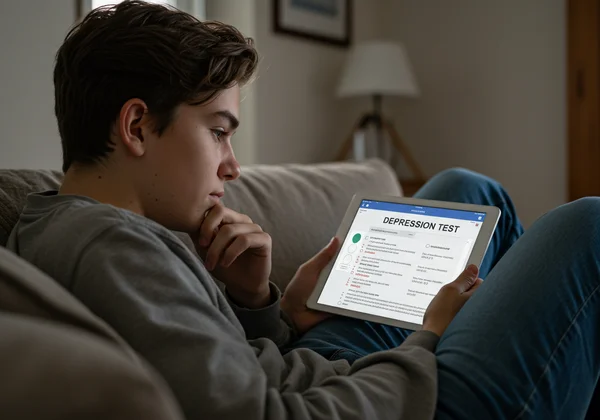Teen Depression Test: Signs, Symptoms, & When to Get Help
October 11, 2025 | By Liam Thornton
Navigating the emotional landscape of adolescence can be a turbulent journey for teens and a source of deep concern for parents. It’s often difficult to distinguish between typical teenage mood swings and the more persistent signs of depression. How do I know if my teenager is just sad or truly depressed? This guide is designed to help parents and teens understand the unique ways depression can manifest during these formative years, recognize key warning signs, and learn when an online screening, like a free teenage depression test, can be a valuable and confidential first step toward getting support.

Understanding Teenage Depression: Beyond Normal Moods
It's one of the most challenging puzzles for any parent: Is my teen’s withdrawal and irritability a normal part of growing up, or is it something more? While moodiness is a hallmark of adolescence, depression is a persistent mental health condition that significantly impacts a teen's ability to function and enjoy life. Recognizing the difference is the first crucial step toward providing the right kind of support.
What Are the Warning Signs of Depression in Teens?
The symptoms of depression in adolescents can be subtle and easily dismissed. They often overlap with the stress of school, social pressures, and hormonal changes. It’s important to look for a consistent pattern of change that lasts for two weeks or more.
Emotional Changes:
- Persistent feelings of sadness, emptiness, or hopelessness.
- Increased irritability, anger, or hostility (often more common in teens than sadness).
- Loss of interest or pleasure in hobbies and activities they once enjoyed.
- Feelings of worthlessness or excessive guilt.
- Difficulty concentrating, remembering details, and making decisions.
Behavioral Changes:
-
Significant changes in sleep patterns—insomnia or sleeping too much.
-
Changes in appetite, leading to weight loss or gain.
-
Withdrawal from friends and family.
-
A drop in school performance or frequent absences.
-
Unexplained physical complaints like headaches or stomachaches.

The Unique Presentation: How Teen Depression Differs from Adults
While adults with depression often present with overt sadness, teen depression can look very different. Irritability, anger, and frustration are frequently the most prominent symptoms. A teen might seem constantly on edge, hostile, or easily frustrated by small things. This can be misread as a bad attitude or defiance, but it is often a core sign of underlying emotional pain. They are also more likely to experience physical symptoms and be sensitive to criticism or rejection. Understanding this unique presentation is key to offering empathy instead of judgment.
Common Triggers and Risk Factors for Adolescent Depression
No single cause leads to depression, but several factors can increase a teen’s vulnerability. Academic pressure to succeed, social challenges like bullying or feeling like an outcast, and family conflict can all contribute. Other significant risk factors include a family history of depression, experiencing trauma or abuse, or dealing with a chronic illness. Awareness of these triggers can help you contextualize your teen's behavior and emotional state.
When and Why to Consider a Teen Depression Test
If you've noticed several of the warning signs persisting, you may feel uncertain about what to do next. This is where a screening tool can be incredibly helpful. A depression test for teens is not a diagnosis, but it serves as an objective way to organize your observations and measure the severity of symptoms, providing a clearer picture of your teen’s emotional wellbeing.
The Role of Online Screening: A First Step Towards Clarity
An online screening is a confidential, low-pressure first step. For a teenager who is hesitant to talk, taking a private test can feel less intimidating than a face-to-face conversation. For parents, the results can validate their concerns and provide a concrete starting point for a discussion. It helps shift the conversation from "What's wrong with you?" to "I'm concerned, and I want to help." It’s a tool for opening doors to communication and support. You can try our free tool to gain some initial insights.
How Our Free Depression Test for Teens Works
Our screening tool is designed to be simple, accessible, and completely confidential. Based on scientifically validated principles used in professional settings, the test asks a series of questions about feelings and behaviors over the past two weeks. The process is straightforward:
- Answer the questions honestly from your own or your teen's perspective.
- Receive an instant summary of the results, categorized into levels like mild, moderate, or severe.
- Unlock deeper insights with an optional AI-powered report that can help identify specific challenges and strengths.
This confidential screening offers a private way to assess symptoms without pressure or commitment.

Interpreting the Results: What Your Teen's Score May Indicate
Receiving a score can be illuminating. A low score might suggest that the symptoms are mild or situational, while a moderate to severe score indicates that it's time to take more definitive action. It's vital to remember that the score is not a label but a guide. It provides a snapshot of current emotional health and helps determine the urgency of seeking professional guidance. Regardless of the score, if your gut tells you something is wrong, trust it.
Supporting Your Teen: Next Steps After a Screening
Whether you’ve used an online test or simply observed concerning signs, the next steps involve communication, support, and professional guidance. Helping a depressed teenager requires patience, empathy, and a proactive approach. The goal is to let them know they are not alone and that help is available.
Opening Lines: How to Talk to a Depressed Teenager
Starting the conversation is often the hardest part. Approach your teen with love and concern, not accusation. Choose a calm, private moment. Use "I" statements to express your worries, such as, "I've noticed you seem really down lately, and I'm worried about you." Avoid phrases like, "You just need to cheer up." Instead, listen without judgment and validate their feelings by saying things like, "That sounds really tough."

When to Seek Professional Help: Therapists, Counselors, and Doctors
If symptoms are moderate, severe, or interfering with daily life, it is crucial to seek professional help. Your family doctor is a great starting point; they can rule out any physical causes and provide a referral to a mental health specialist. Therapists, psychologists, and counselors who specialize in adolescent mental health can provide effective treatments like cognitive-behavioral therapy (CBT) to help teens develop coping skills. An online depression test can give you the confidence to start that conversation with a healthcare provider.
Creating a Supportive Environment: Everyday Strategies for Parents
Beyond professional help, a stable and loving home environment is a powerful protective factor. Encourage healthy routines, including regular sleep, balanced meals, and physical activity. Spend quality time together doing low-key activities your teen enjoys. Keep the lines of communication open and be patient—recovery is a process with good days and bad days. Your unwavering support is one of the most important tools in their recovery.
Empowering Your Teen: Taking Action Against Depression
Recognizing the signs of depression in your teenager is a profound act of love and attention. While distinguishing these signs from normal adolescent angst can be hard, you don't have to do it alone. Using a tool like a free and confidential online screening can provide the clarity needed to take the next step. It empowers you and your teen with knowledge, paving the way for open conversations and professional support.
Remember, depression is treatable, and early intervention is key. Take the first step today to better understand your teen’s emotional health. Visit our free, science-based screening test to begin understanding your teen's emotional health.
Frequently Asked Questions About Teen Depression
How do I know if my teenager is just sad or truly depressed?
Sadness is a normal human emotion that is usually temporary and linked to a specific event. Depression, however, is a persistent state of low mood, irritability, and loss of interest that lasts for at least two weeks and significantly impairs daily functioning. Look for a pattern of multiple symptoms rather than just a single feeling.
Can an online depression test accurately assess my teen?
An online screening is not a substitute for a professional diagnosis, but it is a highly effective initial step. Our test is based on widely recognized screening principles to help identify potential symptoms and their severity. It provides a valuable, private, and objective starting point for understanding your teen's emotional state and deciding if it’s time to seek professional help.
What should I do after my teen takes a depression test?
Use the results as a conversation starter. If the score indicates mild symptoms, focus on open communication and creating a supportive home environment. If the score is moderate or severe, it is a strong indicator that you should schedule an appointment with a family doctor or a mental health professional for a formal evaluation.
What are common warning signs of depression in teenagers?
Key warning signs include persistent irritability or anger, loss of interest in activities, withdrawal from friends and family, changes in sleep or appetite, and a decline in school performance. Unlike adults, teens are more likely to express depression through anger and hostility than outright sadness. You can get a quick assessment on our site to explore these signs further.